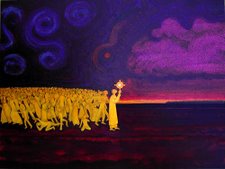including this:
Friday, April 27, 2007 TCR Deeply Regrets Vatican Invitation of Alleged War
Criminal Henry Kissinger

"Mary Ann Glendon, a U.S. law professor and president of the Pontifical Academy of Social Sciences, invited Kissinger to speak at the academy's April 27-May 1 plenary session.
"The academy, which advises the Vatican on social issues, was to focus on "Charity and Justice in the Relations Among Peoples and Nations." ...more
Genocide in East Timor:
The 1975 Indonesia invasion of -- and subsequent genocide in -- East Timor was delayed a few hours so as not to embarrass President Ford and Kissinger, who were visiting Jakarta. Noam Chomsky writes, "The Indonesia invasion of December 1975 following several months of military actions that were well-known to Australia, the US and Britain was an unprovoked act of aggression, a war crime, which makes all participants war criminals, from Henry Kissinger on down."
Despite a UN condemnation and call for the immediate withdrawal of troops and for "all States to respect the territorial integrity of East Timor as well as the inalienable right of its people to self-determination," Secretary of State Henry Kissinger increased the flow of arms to Indonesia and instructed the UN ambassador Moynihan to, according Chomsky, "to block any diplomatic reaction to Indonesia's criminal aggression, adopting the stance that Australian diplomat Richard Woolcott...admiringly called 'Kissinger realism,' a technical term for cowardly thuggishness and criminality."
Moynihan writes in his memoirs "The Department of State [under Kissinger] desired that the United Nations prove utterly ineffective in whatever measures it undertook. This task was given to me, and I carried it forward with no inconsiderable success." In the following few months some 60,000 people had been murdered -- 10 percent of the population.
Limited Nuclear War: An "Appropriate" Policy
As one of the most powerful men in the United States, Kissinger never shied away from the potential use of nuclear weapons. In his memoirs, Kissinger equates courage with an ability to "face up to the risks of Armageddon," for example, "go[ing] to the brink over Pakistan." In response to tensions in the Middle East in 1973, Kissinger ordered a worldwide alert for U.S. nuclear forces, with B-52s loaded with 20-megaton nuclear bombs taking off from Guam, US aircraft carriers loaded with nuclear weapons heading toward the Mediterranean, and U.S. anti-aircraft missiles raised to firing position in West Germany. The goal of this action, among many others, was, as Kissinger wrote, "to ensure that the Europeans and Japanese did not get involved in the diplomacy regarding the Middle East." Kissinger informed the Soviet ambassador, "This is a matter of great concern. Don't you pressure us. I want to repeat again, don't pressure us."
Although the crisis thankfully subsided when the Soviets declared they had no intention of going into the Middle East, it was evidence that Kissinger (who was the basis for Dr. Strangelove) had no problem with using the most destructive weapons on the planet like chess pieces, with no regard for human lives. Indeed, in 1969, he was, with Nixon, involved in the so-called "Madman: ultimatum to Hanoi, threatening to drop nuclear weapons to end the U.S. invasion of Vietnam. Thanks to popular dissent against the war, Nixon concluded that he could not keep the country together if he went ahead with these plans.
Kissinger's views on nuclear war were expounded in Nuclear Weapons and Foreign Policy (1957). He praised the idea of "limited nuclear war," declaring "Everything depends on leadership of high order, personal initiative and mechanical aptitude; qualities more prevalent in our society than in the regimented system of the USSR." For a capitalist nation, he wrote, "the most productive form of war is to utilize weapons of an intermediary range of destructiveness, sufficiently complex to require a substantial productive effort, sufficiently destructive so that manpower cannot be substituted for technology, yet discriminating enough to permit the establishment of a significant margin of superiority. It would seem that the weapons systems appropriate for limited nuclear war meet these requirements."
"Covert action should not be confused with missionary work."
The recent headlines about the Kurds in Iraq have historical roots which implicate Kissinger in criminal activity as well. In the early 1970s, the Shah of Iran (whose regime had one of the worst human rights records in the world), supported by Kissinger, hoped to use the Kurds to undermine the government of Iraq. The Nixon administration, under the guidance of Kissinger and the CIA, provided the Kurds with weaponry but, according to a Congressional report, "none of the nations who were aiding them seriously desired that they realize their objective of an autonomous state." One CIA memo stated clearly there was never any intention of helping the Kurds achieve an autonomous state, and that "Neither Iran nor ourselves wish to see the matter resolved one way or the other." The Pike Committee investigating CIA abuses concluded "Even in the context of covert action, ours was a cynical enterprise." As a result of these actions,. at least 35,000 Kurds were murdered, and 200,000 Kurdish refugees fled to Iran, but neither Iran or the US gave them adequate humanitarian assistance. "In fact, Iran was later to forcible return over 40,000 of the refugees and the United States government refused to admit even one refugee into the United States by way of political asylum even though they qualified for such admittance." Pike report
Support for apartheid and racist white-minority African States
In a National Security Study Memorandum, Kissinger concentrates on South Africa as a strategic asset, not as a criminal apartheid regime. "The whites are here to stay and the only way that constructive change can come about is through them. We can, by selective relaxation of our stance toward the white regimes, encourage some modification of their current racial and colonial policies...We would maintain public opposition to racial repression but relax political isolation and economic restrictions on the white states..."
MORE at TCR



No comments:
Post a Comment